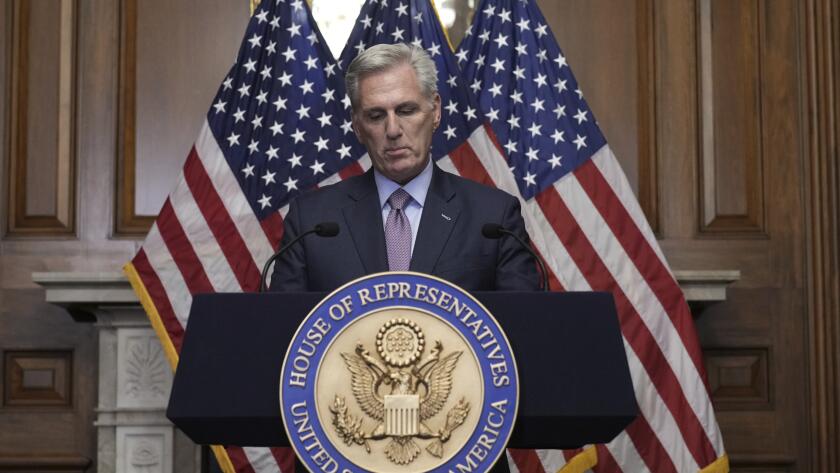Kevin McCarthy is out as House speaker. Here’s what happens next
- Share via
Rep. Kevin McCarthy (R-Calif.) is no longer speaker of the House, following a revolt led by Rep. Matt Gaetz (R-Fla.). Here’s what happens next.
- Share via
After the House of Representatives voted Tuesday to oust Rep. Kevin McCarthy (R-Bakersfield) from his position as speaker, even some lawmakers were confused about what would happen next.
“What now?” one congressman called out from the House floor moments after the vote.
Some confusion is natural: McCarthy is the first speaker in U.S. history to be removed by a vote of the chamber. Here’s what we know about what happens next — and what the drama might mean for the prospects of a government shutdown next month.
Why is McCarthy out?
The House of Representatives voted 216 to 210 on Tuesday to oust McCarthy, following a GOP revolt led by Rep. Matt Gaetz (R-Fla.).
Gaetz had said he would try to dethrone McCarthy if the GOP leader worked with Democrats to pass a stopgap government funding bill. The bill was needed to ensure the government could keep operating.
Despite the threat to his leadership, McCarthy passed the temporary budget bill, with the support of Democrats, just hours before the shutdown deadline Saturday night.
Gaetz kept his promise Monday night by filing a motion to oust McCarthy. Congress took up the motion Tuesday, and eight Republicans joined House Democrats in voting to dump the speaker.
Has this ever happened before?
No. This is the first time in U.S. history that a House speaker has been ousted in the middle of his term.
McCarthy has been in a precarious position since his first day on the job. In order to even get elected as speaker, McCarthy made several concessions to hard-right Republicans such as Gaetz. One of those was to approve rules that allowed just one representative to call a vote for his ouster.
Is McCarthy running again?
McCarthy told Republicans on Tuesday night that he would not seek to regain the gavel, clearing the way for another candidate to take his place.
At a news conference Tuesday evening, in response to a question about whether he’d consider resigning his seat in Congress, McCarthy said, “I haven’t thought about that.”
McCarthy’s ouster from a job he long coveted was induced by far-right Republicans with the support of vengeance-minded Democrats. It was dramatic, but no surprise.
So what now?
Rep. Patrick T. McHenry (R-N.C.), a close McCarthy ally, will act as speaker on a temporary basis.
Under House rules, McCarthy was required to submit a list of possible stand-ins shortly after he was elected speaker. House rules dictate that in the event of a vacancy, the next member on the list would “act as speaker pro tempore until the election of a speaker or a speaker pro tempore.” McHenry was the first name on McCarthy’s list.
“Prior to proceeding to the election of the speaker, it would be prudent to first recess for the relative caucus and conferences to meet and discuss the path forward,” McHenry said Tuesday, calling the House to recess and slamming the gavel.
The House will now take a long break, with no votes expected before next Tuesday.
Who will be the next speaker of the House?
Republicans hope to hold a candidate forum next Tuesday and an election next Wednesday, Punchbowl News reported.
Rep. Hakeem Jeffries (D-N.Y.), the House minority leader, will almost certainly run for speaker, but would need GOP support to secure the position. Such a deal would be without precedent in modern U.S. history.
Gaetz has yet to formally suggest a candidate, but told reporters after the vote that he believed House Majority Leader Steve Scalise of Louisiana would “make a phenomenal speaker.” He also mentioned Rep. Tom Emmer (R-Minn.), another member of GOP leadership whom fellow Republicans have floated as a possible replacement for McCarthy.
Scalise, who voted to save McCarthy, has not said whether he wants the job. He began treatment for blood cancer last month.
What about the government funding fight?
The resolution that passed Saturday funds the government for about seven more weeks, delaying a potential shutdown until mid-November. The bill did not include funding for Ukraine, which President Biden has said he hopes to see in a supplemental measure.
Congress has yet to pass a comprehensive budget package that can satisfy both sides of the aisle. The House has to elect a speaker, pass a funding bill, work out any differences with the Democratic-controlled Senate, and get the funding signed into law before Nov. 17 to avoid a government shutdown. If lawmakers can’t fund the government by then, national parks will turn away visitors, government services will operate at reduced capacity, and members of the military will go unpaid.
“I am concerned with the timing now,” McCarthy said to reporters Tuesday evening. “I truly believe at the end of the day, we can get this all worked out.”
What does this mean for California?
Sen. Dianne Feinstein’s death early Friday morning, Gov. Gavin Newsom’s surprise choice of Laphonza Butler to replace her and the conservative revolt against McCarthy “combined to create a temblor that has reshaped both sides of the state’s political divide,” The Times’ David Lauter writes. Read more here.
Times staff writer Erin B. Logan and Times contributor Cameron Joseph contributed to this report.
More to Read
Get the L.A. Times Politics newsletter
Deeply reported insights into legislation, politics and policy from Sacramento, Washington and beyond. In your inbox three times per week.
You may occasionally receive promotional content from the Los Angeles Times.













